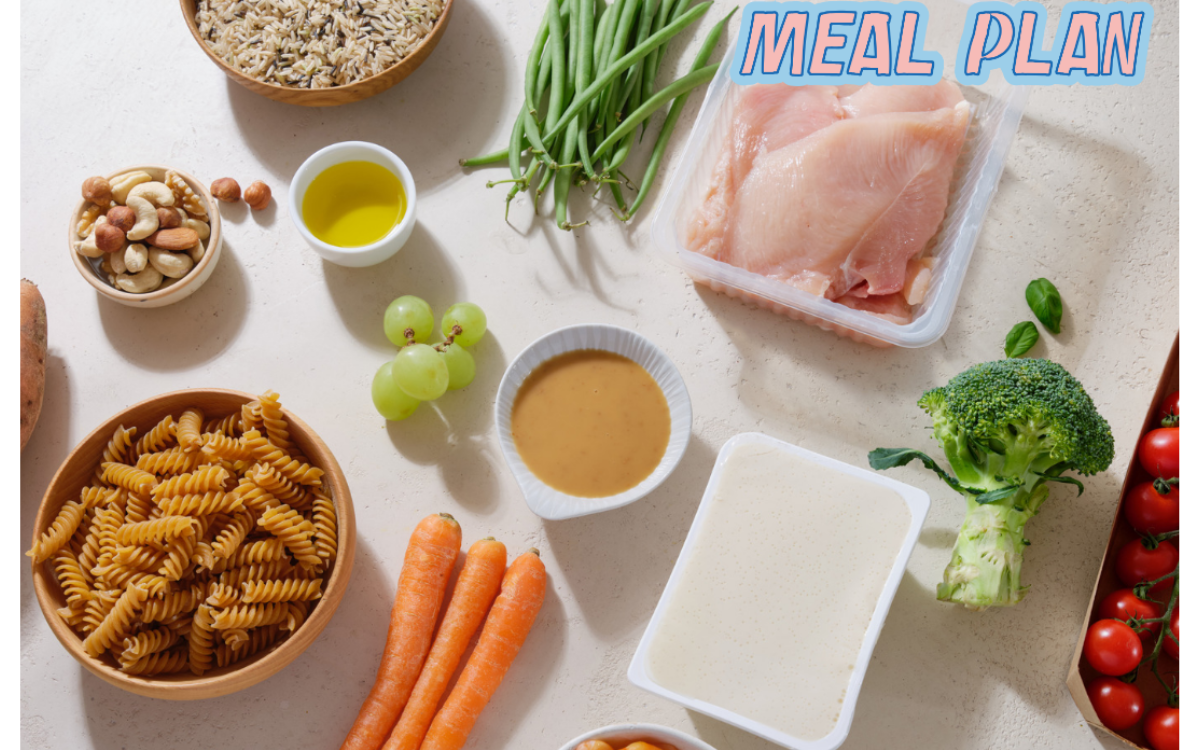Introduction
Meal planning is extra than truly determining what to eat on your next meal; it’s a vital trouble of maintaining a wholesome manner of life. Proper meal making plans now not only ensures you get the nutrients your frame wishes but moreover enables you live heading in the right direction together along with your fitness and well-being goals. In this comprehensive manual, we will delve into the different factors which have an effect on Meal Planning, offering you with valuable insights and pointers for nourishing your body effectively.
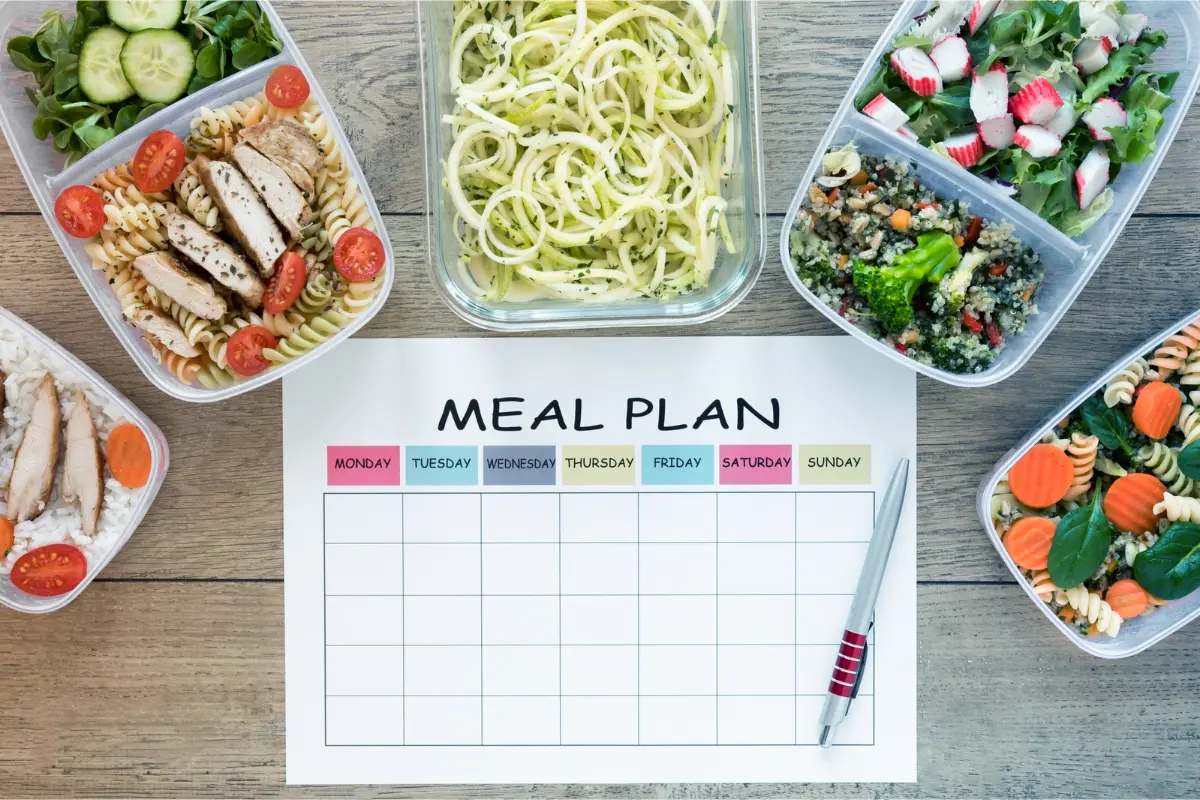
Meal planning you can eat everyday
Certainly, meal making plans for every day consumption involves selecting meals and recipes that aren’t most effective nutritious however also exciting for ordinary consuming. Here are some ideas for food you may include for your day by day meal plan:
Breakfast Options:
- Oatmeal: Start your day with a bowl of oatmeal topped with fresh berries, honey, and a sprinkle of nuts. Oatmeal is a filling and wholesome breakfast desire.
- Greek Yogurt Parfait: Layer Greek yogurt with granola and your favourite end result like strawberries and bananas for a quick and engaging breakfast.
- Avocado Toast: Top whole-grain toast with mashed avocado, a poached egg, and a sprint of warm sauce for a savory morning meal.
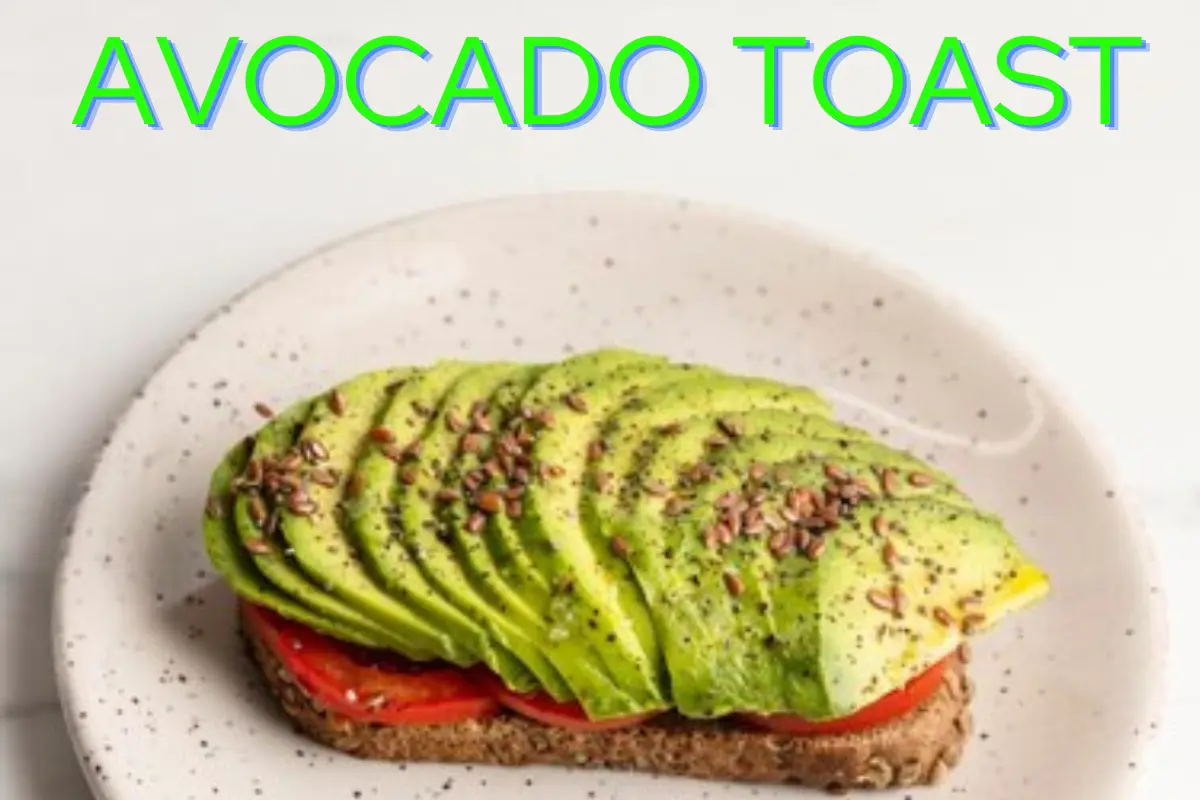
Lunch Ideas:
- Grilled Chicken Salad: Prepare a salad with grilled hen breast, blended vegetables, cherry tomatoes, cucumbers, and a light vinaigrette dressing.
- Vegetable Wrap: Fill an entire-grain wrap with roasted or grilled greens, hummus, and some feta cheese for a satisfying and wholesome lunch.
- Quinoa Bowl: Create a quinoa bowl with cooked quinoa, black beans, corn, diced tomatoes, and a cilantro-lime dressing.
Dinner Choices:
- Baked Salmon: Bake salmon with lemon and herbs and serve it with steamed broccoli and quinoa for a well-rounded dinner.
- Stir-Fried Tofu and Veggies: Stir-fry tofu with a number of colorful greens and a flavorful stir-fry sauce crafted from soy sauce, ginger, and garlic.
- Spaghetti with Tomato Sauce: Opt for complete-grain spaghetti with a homemade tomato sauce loaded with veggies like spinach, mushrooms, and bell peppers.
Snacks:
- Fruit and Nut Mix: Keep a mixture of your favourite nuts and dried fruits handy for a quick and healthy snack.
- Carrot Sticks with Hummus: Carrots and hummus make for a fulfilling and nutritious snack this is smooth to put together.
- Apple Slices with Peanut Butter: Slice up an apple and dip it in peanut butter for a delicious and filling snack.
Remember to live hydrated via consuming lots of water all through the day, and if you have precise dietary options or restrictions, tailor these meal ideas as a consequence.
Meal planning and nutrition
Sure, allow’s dive into the details of meal making plans and nutrition! When it comes to meal planning, it is all approximately being intentional together with your meals picks and creating a well-rounded eating regimen. Here are a few key factors to keep in thoughts:
1. Balanced Meals: Aim to encompass a mixture of macronutrients in every meal. This means incorporating carbohydrates (such as whole grains), proteins (like lean meats, fish, or plant-based resources), and healthy fats (which include avocados or nuts). This aggregate allows offer energy, support muscle growth, and maintain you feeling happy.
2. Colorful Variety: Make your plate colourful by together with a number of culmination and greens. Different colors constitute extraordinary vitamins, so goal for a rainbow of produce. This guarantees you’re getting various nutrients, minerals, and antioxidants that assist typical health.
3. Portion Control: Pay attention to portion sizes to maintain a wholesome weight. Use tools like measuring cups or your hand as a manual. Fill half of your plate with non-starchy greens, one-area with lean protein, and one-region with entire grains or starchy greens.
4. Hydration: Don’t overlook to live hydrated! Drink lots of water all through the day to support digestion, nutrient absorption, and universal well-being.
5. Mindful eating: Practice mindful ingesting with the aid of taking note of your frame’s starvation and fullness cues. Slow down, appreciate your meals, and listen in your body’s signals to avoid overeating.
Remember, every person’s dietary needs are specific, so it is an excellent idea to discuss with a registered dietitian or nutritionist for personalised guidance. They allow you to create a meal plan that aligns with your unique goals and dietary choices.
1. Dietary Preferences and Restrictions
One of the fundamental factors influencing meal planning is your dietary preferences and restrictions. Whether you follow a specific diet like veganism, keto, or have food allergies, it’s essential to tailor your meal plan to accommodate these needs. For instance, vegans need plant-based protein sources, while those on a keto diet focus on high-fat, low-carb options.
1. Food Allergies: Allergies to specific foods or ingredients can restrict meal choices. For example, individuals with nut allergies keep away from nuts and nut-based products.
2. Food Intolerances: Intolerances to certain foods, like lactose or gluten, can limit options and require special attention to ingredient labels.
3. Medical Conditions: Health conditions such as diabetes or hypertension may necessitate dietary restrictions to manage symptoms or control the condition.
4. Religious Restrictions: Many religions have dietary guidelines or restrictions that impact food choices, such as avoiding certain meats or fasting during specific periods.
5. Ethical and Environmental Concerns: Individuals who’re ethically or environmentally aware can also pick to limit sure meals, together with adopting a vegetarian or vegan food regimen to reduce their carbon footprint.
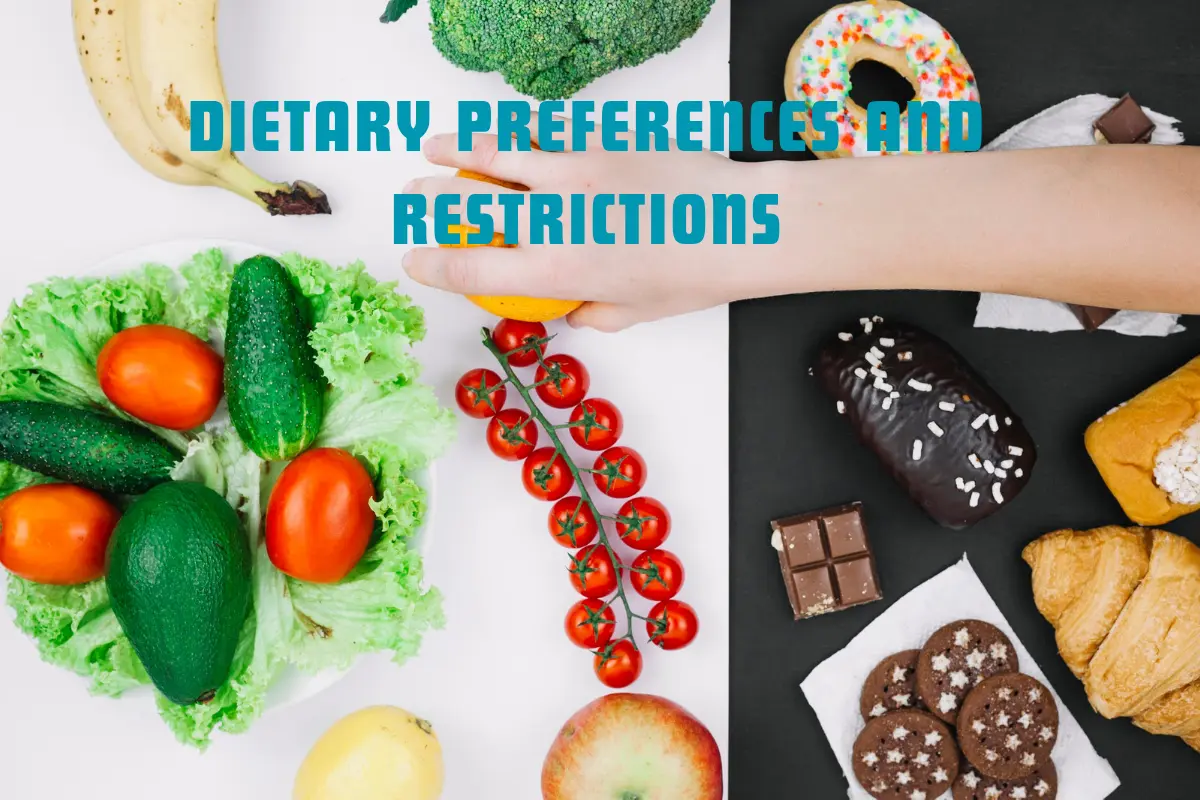
2. Nutritional Goals
To nourish your body effectively, you have to define your dietary dreams. Are you trying to lose weight, gain muscle, or honestly maintain your contemporary physique? Each goal requires a different approach to meal planning. For weight loss, you might focus on portion control and calorie tracking, while muscle gain might require higher protein intake and strength training.
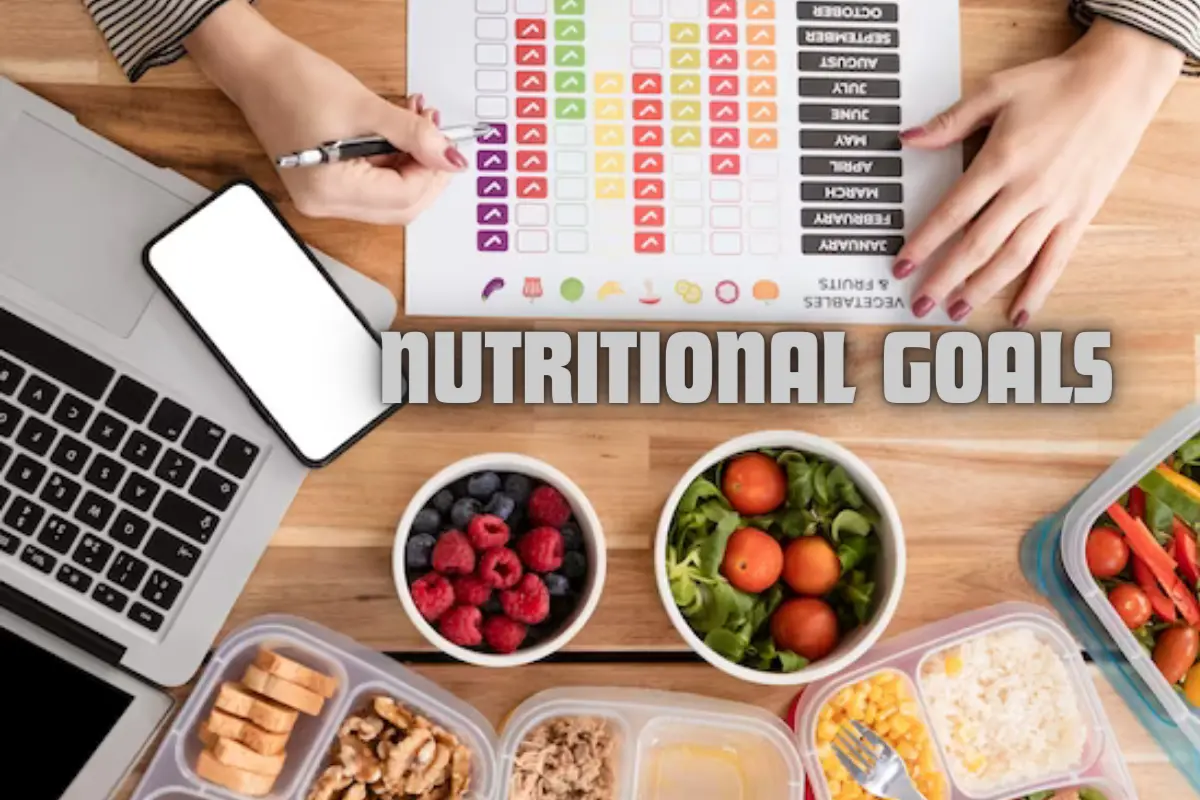
3. Budget and Cost
Meal planning can be influenced by your budget. Eating healthily would not have to break the financial institution. Planning meals around affordable ingredients like beans, rice, and seasonal produce can help you save money while still eating nutritiously.
4. Time Constraints
Modern life often comes with tight schedules, making time a significant factor in meal planning. Quick and easy recipes or meal prep can be a lifesaver for busy individuals. Plan ahead and batch-cook meals to ensure you have nutritious options readily available, even on hectic days.
5. Seasonal and Local Availability
The availability of fresh, seasonal produce can significantly impact your meal planning. Incorporating locally sourced, in-season fruits and vegetables not only supports local farmers but also ensures your meals are packed with flavor and nutrients.
6. Cooking Skills
Your cooking skills can determine the complexity of your meal planning. If you’re a culinary novice, start with simple recipes and gradually expand your cooking repertoire. More advanced cooks can experiment with intricate dishes and techniques.
7. Cultural and Regional Influences
Cultural and regional influences play a vital role in meal planning. Different cuisines offer unique flavors and ingredients. Embrace diversity in your meals to experience a wide range of tastes and nutrients.
8. Meal Timing
The timing of your meals can affect your energy tiers and usual properly-being. Aim for ordinary, balanced meals in the course of the day to preserve constant strength and preserve hunger at bay. Don’t skip breakfast, as it units the tone in your day.

9. Portion Control
Portion control is vital for preserving a healthful weight and stopping overeating. Be. Be mindful of portion sizes, and listen to your body’s hunger cues to avoid unnecessary calories.
10. Health and Weight Goals
Meal plans which are geared toward weight loss, muscle constructing, or the management of chronic sicknesses may be followed by means of humans with particular fitness or weight dreams. The selection of foods and portion sizes are guided by these goals.

11. Social and Environmental Factors
Lastly, social and environmental elements can have an effect on your meal choices. Dining out with buddies or family may also result in extraordinary meals picks than eating by myself. Additionally, the impact of meals production on the surroundings is a growing problem, with many opting for sustainable and eco-friendly food options.
12. Cultural and Social Influences
Cultural and societal influences have an impact on meal planning since they have an impact on taste possibilities and culinary traditions. People typically consist of dishes from their cultural historical past in their cooking, which influences the items they choose and the method of guidance.
Factors Affecting Meal Planning: vedio tutorial.
https://youtu.be/FyCBC48lq7w?si=UaflSexfhsoFQqza
Conclusion
In conclusion, meal making plans is a multifaceted manner that requires careful consideration of various factors. By knowledge your dietary options, dietary desires, price range, and time constraints, you can create a meal plan that nourishes your frame efficiently. Embrace variety to your meals, keep in mind of element control, and don’t forget the effect of your meals alternatives on each your health and the surroundings. With thoughtful planning, you can make informed choices that lead to a more healthy and greater fulfilling existence.
FAQs
What are the 7 factors to consider in planning meals?
Consider nutrition, portion sizes, dietary restrictions, budget, time, seasonality, and personal preferences when planning meals.
What are the 5 principles of meal planning?
The five principles of meal planning are balance, variety, moderation, nutrient density, and adequacy.
What are the 6 steps of meal planning?
The six steps of meal planning are: 1. Set goals and consider dietary needs. 2. Choose recipes and gather inspiration. 3. Create a shopping list. 4. Shop for ingredients. 5. Prep ingredients and meals in advance. 6. Enjoy your delicious and well-planned meals!
